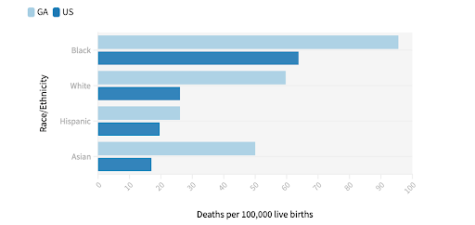Over the years, maternal mortality rates have increased. Maternal Mortality is defined by the Centers for Disease Control and Prevention as the “the death of a woman while pregnant or within 1 year of the end of pregnancy from any cause related to or aggravated by the pregnancy.” According to the Center for Reproductive Rights, Georgia has the highest maternal mortality rate than any other state. Also, African American women in Georgia are more likely to experience pregnancy-related death. The maternal mortality ratio for African American women living in Georgia is 47 deaths per 100,000 to 14.3 deaths per 100,000 for white women living in Georgia.

A study, Maternal Mortality Among African American Women in the State of Georgia: Causes, Policy, and Ethical Considerations was conducted by Georgia Southern University’s faculty at the Jiann-Ping Hsu College of Public Health. This study discussed the factors that cause an increase in maternal mortality rates and aimed to identify the barriers that prevent the reduction in maternal mortality rates in the State of Georgia among African American women. Findings from the study determined that maternal mortality rates are caused by:
Low socioeconomic status
Inadequate nutrition
Stress
Lack of medical treatment
Social Isolation
Communication barriers such as miscommunication
Heart disease
Sepsis
Hemorrhage
Venous thromboembolism
Hypertensive disorders
Amniotic fluid embolism
Peripartum cardiomyopathy
Complications during pregnancy
What can be done to reduce maternal mortality in Georgia?
Maternal mortality is a devastating issue that needs to be addressed. Maternal mortality in Georgia can be reduced by improving health services and family planning care, adopting healthier lifestyles, and addressing health issues before pregnancy. Current initiatives to tackle maternal mortality are Hear Her Campaign, National Pregnancy-related Mortality Surveillance, and Enhancing Reviews and Surveillance to Eliminate Maternal Mortality.